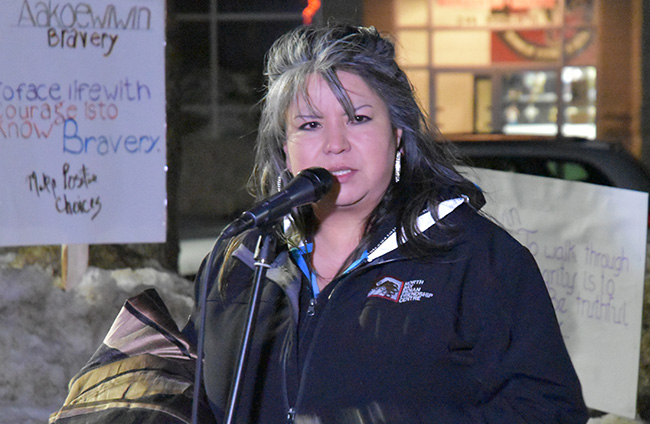North Bay shouts out for justice for Tina Fontaine and change to the system

By Kelly Anne Smith
NORTH BAY – A gathering honouring Tina Fontaine took place Sunday night in downtown North Bay as the cold wind whipped vigil-goers.
On the traditional lands of Nipissing First Nation, about sixty people crowded the gathering spot at Oak and Main streets. After a sage smudge to cleanse for a positive atmosphere, they listened to the opening song of Brenda Lebreche after answering the social media call to show support for 15-year old murdered Tina Fontaine.
Signs, with hopes and prayers crossed off and replaced with policy change and change to the child welfare system and the judicial system and the like, were implanted in the snow surrounding the vigil for Tina Fontaine.
Canadians reacted last Friday with dismay, anger and disbelief to the not-guilty verdict of second-degree murder by the then 53-year Richard Cormier, a suspect wiretapped and heard by police to make confessionary statements.
Witnesses identified the comforter of the accused, wrapping the dead girls body, weighed down with rocks, in a bag, and pulled from the Red River in 2014. Six months later the suspect was arrested in Vancouver. He had a long violent criminal history.
Tiny Tina left the Sagkeeng First Nation and her loving Great Aunt to visit her mother in Winnipeg. There she ran away from foster care. The police encountered her after she had been reported missing but she was not taken into custody. Days later, she would be murdered, as her father was.
The North Bay organizer of the vigil for Tina Fontaine, Christine Cameron, told the crowd, “Here we are having to do it again, less than two weeks after Colten Boushie’s trial.”
Cameron, from Little Pine First Nation of Treaty Number 6, said she was wearing a blanket like others who gather or walk for Tina. The Blanket is symbolic of how Tina’s body was found. The blanket is also soothing in times of grief.
Someone from the crowd shouted what can we do? Catherine Murton Stoehr, with a doctorate in History, took to the microphone and suggested that the Truth and Reconciliation Commission’s 94 calls to action is the place to start.
Associate Professor of History Katrina Srigley said there were many reasons she was standing outside on a cold and windy Sunday evening to be with others in the protest for justice for Tina. “The three most important reasons for me would be to acknowledge Tina Fontaine and her family and send out strength and support from North Bay to her family and to her community and to the memory of her. And then secondly, certainly to recognize and acknowledge the persistence of racism and misogyny in our system of justice, I mean the Canadian legal system. I’m trying mindfully not to use the word justice because there is no justice here. And thirdly, unless we start coming out and acknowledging and recognizing and standing together in these moments, nothing actually will ever change because it’s structural. This isn’t just about one incident or one death. This is about thousands of deaths that are ongoing with problems of racism and misogyny.”
Vigil organizer Christine Cameron gave regrets on behalf of Nipissing First Nation Chief Scott McLeod who was unable to attend having travelled to Northwest Territories to educate on Treaties and fisheries management.
In a facebook post, Nipissing First Nation Chief Scott McLeod said, “Indigenous people are not simply angered about the verdict only but rather all the passive racism that helped Raymond Cormier get away with the murder of Tina Fontaine.”
As dusk turned to dark, Christine Cameron told of how the child welfare system failed Tina, failed herself and failed thousands more Indigenous children in Canada. She herself is a 60s Scoop Child brought up in a non-Indigenous household, encountering racism daily. “We will not get over it because this is my life.” Cameron wants systemic racism stopped. She calls for positive change and hope in Indigenous youth, the largest growing population in Canada. “This is the change that needs to happen. This is a national problem.”
Concluding the vigil, Cameron pleaded with non-Indigenous Canada, “Be inclusive, be kind.”


